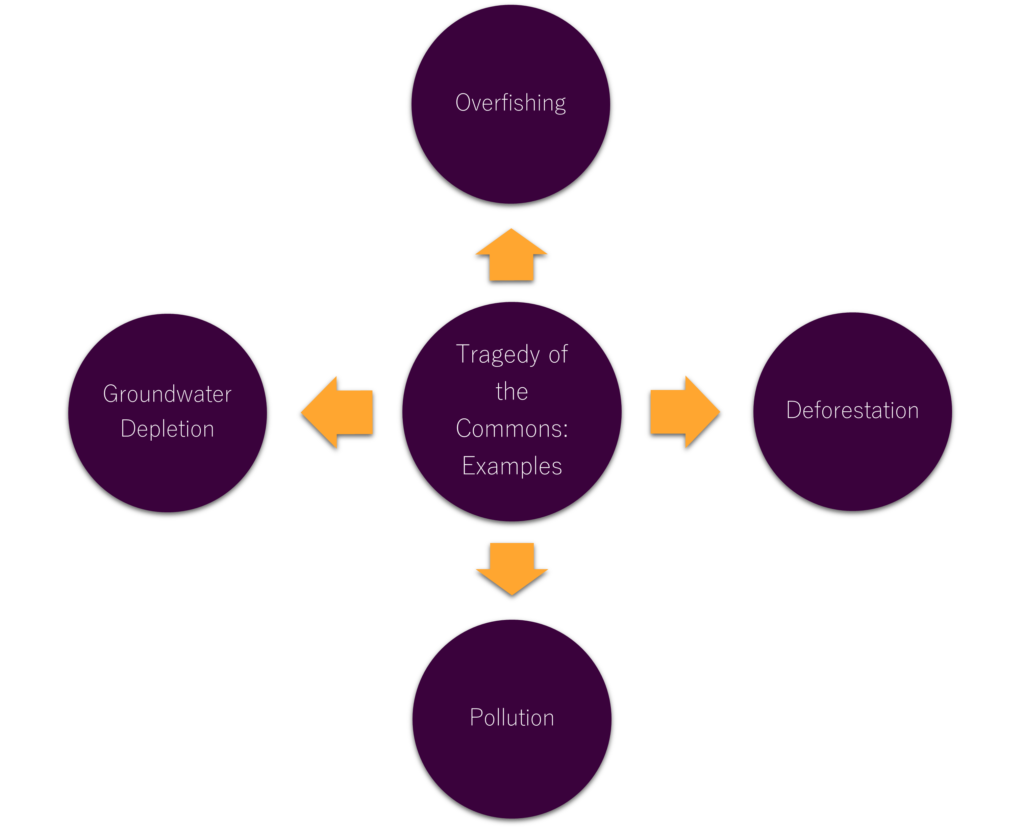Some of the earliest mentions of the tragedy of the commons date back as far as Aristotle. However, the British author William Forster Lloyd formally introduced the concept of “tragedy of the commons” in 1833. He explained how individuals, driven by self-interest, deplete shared resources without private property rights. Garrett Hardin further popularized this idea in 1968, making it a key concept in environmental degradation and resource depletion.
The tragedy of the commons is evident in many areas, such as the decline of ocean fish populations and the overuse of public goods. It shows how the lack of property rights can lead to the overexploitation of shared resources. Hence, this ultimately harms the collective welfare.
Econometrics Tutorials with Certificates
What is the Tragedy of the Commons?
Key Concepts and Definitions
The tragedy of the commons is an economic theory that elucidates how individuals, pursuing their self-interest, will deplete shared resources. Despite its detrimental effects, no individual benefits from destroying these resources.
Additionally, the tragedy of the commons revolves around the conflict between individual and collective interests. Resources that are non-excludable and rivalrous in consumption are subject to overexploitation. The lack of property rights further exacerbates this issue.
Basic Principles of Commons
The tragedy of the commons is rooted in several key principles:
- Common resources are prone to overexploitation due to the lack of conservation incentives.
- The free-rider problem occurs when individuals benefit from shared resources without contributing to their upkeep.
- Collective action is essential to prevent the depletion of common resources, yet it poses significant challenges.
This theory applies to various environmental and economic issues, including overfishing, deforestation, air pollution, and traffic congestion.
The Psychology Behind Resource Exploitation
The tragedy of the commons stems from the psychology of self-interest and short-term thinking. That is, individuals frequently prioritize their immediate gains over the collective benefits in the long run. This approach fosters a “use it or lose it” mentality, prompting rapid exploitation of resources, fearing others will follow suit. Hence, the collective irrationality that arises from individual rationality leads to resource depletion.
Wesley Schultz, a social psychologist from California State University, found that existing litter significantly predicts littering behaviour. His research shows that people are more inclined to litter in areas already littered than clean ones (Source: Littering in Context: Personal and Environmental Predictors of Littering Behavior). This phenomenon mirrors the psychology behind the tragedy of the commons where shared resources are overexploited because everyone does so.
Environmental Impact and Resource Depletion
The tragedy of the commons has severe environmental consequences, including environmental degradation, ecosystem disruption, and long-term environmental impacts. These issues arise when individuals exploit shared resources for personal gain, often leading to the depletion and degradation of those resources.
Natural Resource Degradation
The collapse of the Grand Banks fishery off the coast of Newfoundland, Canada, is a notable example. Advancements in fishing technology, coupled with a “race to the bottom” mentality, led to the overfishing and eventual depletion of the region’s cod population. Similarly, resource depletion through activities like illegal logging contributes to deforestation, impacting the environment’s ability to store carbon and regulate the climate.
Ecosystem Disruption
The exploitation of shared resources can also disrupt delicate ecosystems. For instance, pollution from wastewater dumping can reduce a body of water’s self-cleansing abilities, leading to environmental degradation and the collapse of aquatic habitats. The formation of ocean “dead zones” due to excessive nutrient runoff is a stark example of how the tragedy of the commons can have cascading effects on entire ecosystems.
Long-term Environmental Consequences
| Consequence | Impact |
|---|---|
| Biodiversity Loss | The depletion of resources and disruption of ecosystems can lead to the loss of plant and animal species, threatening the overall health and resilience of the environment. |
| Climate Change | Activities that contribute to environmental degradation, such as deforestation and pollution, can amplify the effects of climate change, further exacerbating the long-term consequences. |
| Reduced Ecosystem Services | The diminishment of natural resources and healthy ecosystems can diminish the valuable services they provide, such as water filtration, air purification, and flood mitigation, which society heavily relies on. |
Modern Examples of Resource Overexploitation

The tragedy of the commons is not just a theoretical concept; it has become a reality in various scenarios. The overfishing of the Pacific bluefin tuna is also a prime example. Its population has dwindled to just 3% of its original size due to excessive fishing. This unsustainable practice threatens the species’ survival, highlighting the urgency for effective management of marine ecosystems.
Deforestation of rainforests worldwide is another clear example of the tragedy of the commons. Unchecked logging has ravaged these critical habitats, causing severe impacts on biodiversity, carbon sequestration, and indigenous communities’ livelihoods. The consequences of this depletion are far-reaching, exacerbating climate change by destroying natural carbon sinks.
Air pollution in urban areas is a further manifestation of the tragedy of the commons. The cumulative effect of vehicle emissions and industrial activities has severely degraded air quality. This has further led to premature deaths and serious health issues, emphasizing the need for collective action to address this environmental concern.
Other instances of overexploitation include groundwater depletion, traffic congestion, and the COVID-19 pandemic’s panic buying. Therefore, these cases show how unchecked individual interests can exhaust shared resources, jeopardizing collective well-being.
Economic Implications of the Commons
The tragedy of the commons signifies a critical economic failure, where the true costs of resource utilization are not borne by the users themselves. This scenario further results in the inefficient allocation of resources and their overexploitation. Theories in economics propose that assigning property rights or implementing regulatory frameworks can mitigate these issues.
The concept of the tragedy of the commons is also intricately connected to the free-rider problem and the challenge of efficiently managing public goods. In scenarios where resources are held in common, individuals exploit them for personal benefit, disregarding the collective impact. Hence, this behaviour ultimately leads to the depletion or degradation of the resource over time.
| Economic Theory | Relevance to the Tragedy of the Commons |
|---|---|
| Externalities | The tragedy of the commons represents certain externalities where the true costs of resource use are not reflected in individual decision-making, leading to inefficient resource allocation and overexploitation. |
| Resource Allocation | The lack of property rights or regulatory measures in a commons scenario results in the undervaluing of resources, leading to their overuse and suboptimal allocation. |
| Market Failure | The tragedy of the commons is a prime example of market failure, where individual self-interest trumps the collective good, causing the depletion or degradation of shared resources. |
To address these economic implications, policymakers and economists have proposed various solutions. Assigning property rights or implementing regulatory frameworks are among the proposed approaches. These strategies aim to align individual incentives with the long-term sustainability of the commons.
Solutions and Management Strategies
Addressing the Tragedy of the Commons necessitates a multifaceted approach. Community-based resource management stands out, where local communities establish rules and systems for shared resources. This method has proven effective for indigenous communities, promoting collective responsibility and sustainable practices.
Government regulation and market-based approaches also offer viable solutions. Implementing measures like fishing quotas, carbon pricing, and community-managed forests is crucial. Therefore, the goal is to align individual interests with the collective benefit, setting clear rules for resource use and conservation.
Education and awareness campaigns are also vital for resource conservation. By educating individuals about sustainable practices, such as water-saving or responsible waste management, they can make informed choices. These choices benefit the collective, further promoting a more sustainable future.
| Solution | Description | Example |
|---|---|---|
| Community-based management | Local communities establish rules and systems to govern the use of shared resources | Community-managed forests |
| Government regulation | Measures such as quotas, taxes, and standards to limit resource use and promote conservation | Fishing quotas, carbon pricing |
| Market-based approaches | Incentives and pricing mechanisms to align individual and collective interests | Tradable pollution permits, eco-labeling |
| Education and awareness | Informing individuals about the importance of sustainable practices and resource conservation | Campaigns on water conservation, waste reduction |
Private Property Rights as a Solution
Assigning private property rights is often proposed as a solution to the tragedy of the commons. This approach, advocated by some economists, aims to create incentives for long-term resource management. Examples include individual transferable quotas in fisheries or private ownership of grazing lands. However, privatization can also lead to issues of equity and access. The effectiveness of this approach depends on the nature of the resource and the social context.
Hardin’s seminal 1968 essay on “The Tragedy of the Commons” heavily influenced the way people think about environmental concerns. Hardin’s concept suggests that without controls on access and use of resources, over-use is inevitable as demand grows. The solution is greater reliance on property rights, as they can incentivize owners to act as stewards and prevent overuse of resources.
Indeed, property-based institutions have been successful in protecting various ecological resources. Land trusts, for example, have been instrumental in preserving sensitive habitats and ecosystems. Moreover, enhanced technologies and a greater understanding of ecological conditions make it possible to define and defend property rights in threatened ecological resources, leading to more sustainable practices in environmental conservation.
However, the privatization of resources is not without its challenges. While privatization of resources can offer potential solutions to the tragedy of the commons, the effectiveness and implementation of such approaches require careful consideration of the unique social, environmental, and economic factors at play. Striking the right balance between private property rights, government regulation, and collective stewardship remains a critical challenge in managing common pool resources.
Conclusion
The complexities of the tragedy of the commons, encompassing the atmosphere and oceans, necessitate a unified approach. Climate change, overfishing in international waters, and the proliferation of space debris underscore the imperative for collective action. Landmark agreements, such as the Paris Agreement on climate change and the United Nations Convention on the Law of the Sea, have endeavoured to establish frameworks for their management.
Yet, the voluntary nature of many agreements and the challenge of enforcing compliance across sovereign nations pose formidable obstacles. The implementation of such measures remains a persistent challenge. In an increasingly interconnected world, the necessity for robust international agreements and effective global resource management strategies is more apparent than ever. The fostering of collective action among nations is critical to ensuring the preservation of our shared global resources and mitigating the tragedy of the commons on a global scale.
Econometrics Tutorials with Certificates
This website contains affiliate links. When you make a purchase through these links, we may earn a commission at no additional cost to you.


